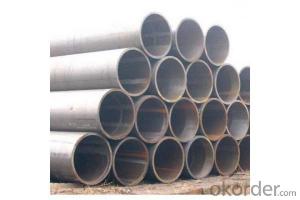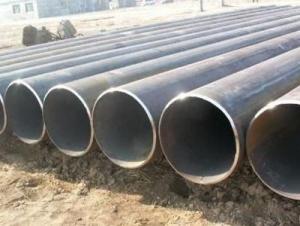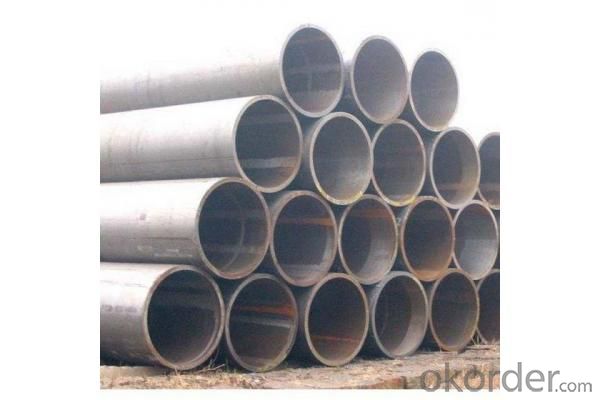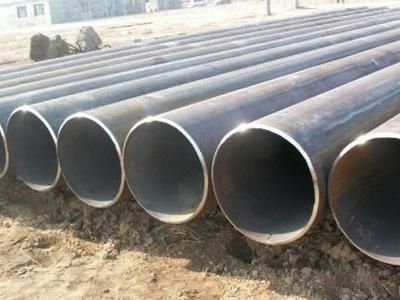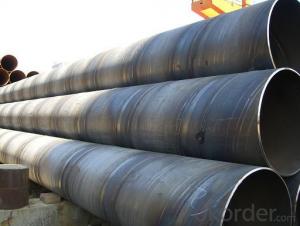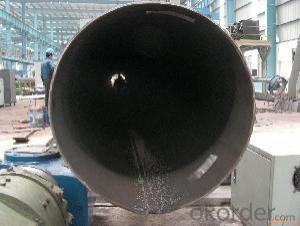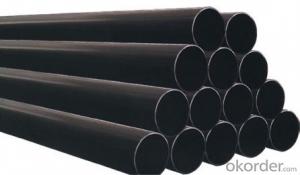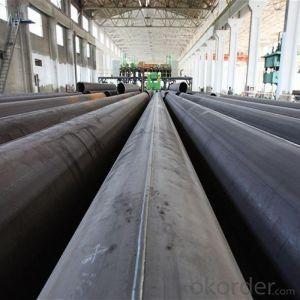API SSAW LSAW CARBON STEEL PIPE LINE OIL GAS PIPE 60''
- Loading Port:
- Tianjin
- Payment Terms:
- TT OR LC
- Min Order Qty:
- 5 m.t.
- Supply Capability:
- 3000 m.t./month
OKorder Service Pledge
OKorder Financial Service
You Might Also Like
Packaging & Delivery
Packaging Detail: | standard export packing or as customer's requirement |
Delivery Detail: | within 10 - 30 days |
Specifications
Spiral Welded Steel Pipes and Tubes
1.Material:Q195-Q235
2.Length:1-12m
3.WT:1.0-14mm
4.O.D.:20-273mm
Spiral Welded Steel Pipes and Tubes
Product Description:
1.Material : Q235,Q345,L245,L290,L360,L415,L450,L485,GrB,X42,46,X52,X56,X60,X65,X70,X80,X100
2,Standard: SY/T5037-2000,GB/T9711-2011,API Spec 5L PSL1/PSL2,ASTM A252\A53,ISO3183,DIN17172,EN10217,JIS G3457,AWWA C200,ASTM A139,ASTM A671,ASTM A672
3.Wall thickness: 3.0mm-30mm
4.Outer diameter: φ168mm-3020mm
5,Length: 5m-12m or as your requirement
6,Corrosion protection standard: DIN30670,DIN30671, AWWAC210, AWWA C203, SY/T0413-2002,SY/T0414-2002
7,Application: Oil, gas, natural gas, water pipe, thermal electricity pipe, steel structure engineering, etc
Q195-q345 Material Steel Pipe's Materials
Elements | Chemical Compsition% | Mechanical Property | ||||||
C% | Mn% | S% | P% | Si% | Yield Point (Mpa) | Tensile Strength(Mpa) | Elongation | |
Q195 | 0.06-0.12 | 0.25-0.50 | <0.050< span=""> | <0.045< span=""> | <0.030< span=""> | >195 | 315-430 | 32-33 |
Q215 | 0.09-0.15 | 0.25-0.55 | <0.05< span=""> | <0.045< span=""> | <0.030< span=""> | >215 | 335-450 | 26-31 |
Q235 | 0.12-0.20 | 0.30-0.70 | <0.045< span=""> | <0.045< span=""> | <0.030< span=""> | >235 | 375-500 | 24-26 |
Q345 | <0.20< span=""> | 1.0-1.6 | <0.040< span=""> | <0.040< span=""> | <0.55< span=""> | >345 | 470-630 | 21-22 |
Packaging & Delivery
Packaging Detail: | Normal exporting packing,in container or bulk vessel or as per clients' request |
Delivery Detail: | 2 months after confimed contract |
Specifications
Large Diameter API 5L X70 PSL2 LSAW Steel Pipe
Grade: X42, X46, X50, X52, X60, B, C
OD: 1.5"-28"
WT: SCH10-SCH160
Large Diameter API 5L X70 PSL2 LSAW Steel Pipe
Specifications:
u Standard: API 5L
u Grade: B, C, X42, X46, X50, X52, X56, X60, X65, X70, X80
u OD: 1.5"-28"
u WT: SCH10-SCH160
u Length: 5-12m
u Ends Finish: plain end, bevel end, grooved end
u Surface Treatment: bare, black varnished, oiled finish, red color, anti-corrosion, 3PE, FBE or epoxy coating
u Technique: hot rolled or cold drawn
u Application: api 5l steel pipe for conveying oil, water, gas
u Invoicing: based on theoretical weight or actual weight
u Payment Terms: L/C at sight, T/T or Western Union
u Trade Terms: FOB, CFR, CIF
u Certification: ABS manufacturing assessment, ABS design assessment, API 5CT, API 5L, DNV manufacturer certificate, ISO9001 quality management system certificate, ISO14001 environment management system certificate, GB/T28001 occupational health and safety management system certificate, A1 class manufacturing license of special equipment certificate, CCS, GL, LR, SGS, TüV, PDE
- Q: What are the different types of supports used for steel pipes in buildings?
- Some common types of supports used for steel pipes in buildings include pipe hangers, clamps, brackets, and roller supports. These supports are designed to provide stability, prevent sagging or bending, and distribute the weight of the pipes evenly. The choice of support depends on factors such as pipe size, location, and load requirements.
- Q: How are steel pipes used in the manufacturing sector?
- Steel pipes are widely used in the manufacturing sector for various purposes such as transporting fluids, gases, and solid materials, as well as providing structural support in buildings and machinery. They are commonly used in industries like oil and gas, construction, automotive, and manufacturing plants for their durability, strength, and resistance to corrosion. Steel pipes enable efficient and reliable transportation of materials, facilitating the manufacturing process and ensuring the smooth operation of industrial systems.
- Q: What are the quality control measures for steel pipe production?
- Quality control measures for steel pipe production typically involve various inspections and tests at different stages of the manufacturing process. Some of the key measures include: 1. Raw material inspection: Ensuring that the steel used for pipe production meets specified standards for chemical composition, mechanical properties, and dimensional accuracy. 2. Dimensional inspection: Checking the outer diameter, wall thickness, and length of the pipes to ensure they meet the required specifications. 3. Welding inspection: Verifying the quality of welds by conducting non-destructive tests, such as ultrasonic or radiographic testing, to detect any defects or discontinuities. 4. Surface inspection: Examining the pipe surface for any defects, such as scratches, pits, or corrosion, which can affect the overall quality and performance. 5. Mechanical testing: Performing tests like tensile strength, yield strength, and impact resistance to assess the mechanical properties of the pipes and ensure they meet the desired standards. 6. Pressure testing: Subjecting the pipes to hydrostatic or pneumatic pressure tests to verify their ability to withstand the intended operational pressures without leakage or failure. 7. Coating inspection: Checking the quality and uniformity of any protective coatings or linings applied to the pipes to prevent corrosion or other forms of deterioration. 8. Documentation and traceability: Maintaining records of all inspections, tests, and certifications to provide traceability and ensure compliance with relevant industry standards and customer requirements. These quality control measures help to ensure that steel pipes are manufactured to the highest standards, possess the required mechanical and dimensional properties, and are fit for their intended application.
- Q: What are the different methods of pipe insulation for steel pipes?
- Various methods can be employed to insulate steel pipes, each offering distinct advantages and suitability for specific applications. Some commonly utilized techniques encompass: 1. Fiberglass insulation: Esteemed as a highly favored pipe insulation method, fiberglass insulation comprises fine glass fibers and is obtainable in diverse formats like rolls, sheets, or pre-formed sections. It boasts a lightweight nature, effortless installation, and exceptional thermal insulation attributes. 2. Foam insulation: Another efficacious means of insulating steel pipes is foam insulation, which can be procured in various forms including rigid foam boards or spray foam. It is renowned for its high insulating capacity and its ability to seal gaps and cracks, thereby enhancing energy efficiency. 3. Rubber insulation: Rubber insulation, also referred to as elastomeric insulation, is extensively employed in HVAC systems to insulate steel pipes. It possesses flexibility, durability, and resistance to moisture, making it suitable for both indoor and outdoor applications. Additionally, rubber insulation offers commendable thermal and acoustic insulation properties. 4. Polyethylene insulation: Polyethylene insulation presents a cost-effective alternative for insulating steel pipes. It can be found in diverse formats such as foam tubes or molded sections and is effortless to install. Polyethylene insulation provides commendable thermal insulation, safeguards against condensation, and exhibits resistance to water vapor diffusion. 5. Cellular glass insulation: Cellular glass insulation, a rigid insulation material produced from crushed glass and a foaming agent, is acknowledged for its exceptional thermal insulation attributes as well as its resistance to moisture, fire, and chemicals. It is commonly employed in cryogenic and high-temperature applications. When selecting the appropriate pipe insulation method for steel pipes, it is imperative to consider factors such as temperature, moisture conditions, and project-specific requirements. Seeking guidance from a professional or insulation expert can aid in determining the optimal insulation method based on the specific needs and conditions of the project.
- Q: What is the difference between the stainless steel pipe welded pipe and seamless pipe?
- Grain size: usually, the grain size of the metal is related to the heat treatment temperature and the time at which the metal is kept at the same temperature. Therefore, the welded pipe and seamless tube annealing of the same grain size. If the minimum tube cold treatment, the grain size of the weld metal is smaller than the grain size, welding or grain size is the same.Strength: the strength of the pipeline in the composition of the alloy and alloy containing the same and the same heat treatment of seamless tube and seamed tube essentially consistent strength. After the tensile test and three-dimensional vibration test, tube tearing almost all occurred in the welding point or away from the heated area where. This is because there is little impurity in the weld and the nitrogen content is slightly higher, so the strength of the welded joint is better than that of other parts. However, the ASME Boiler and Pressure Vessel Association believes that the seamed tube can withstand 85% of the allowable pressure, which is mainly due to improved welding equipment data collection prior to today. The provisions of ASME 100% completely under license by ultrasonic testing pressure tube. Similarly, Europe and Asia also stipulates that can ensure the quality of welding performance by eddy current test tube, the eddy current testing is subject to legal procedures and licensed institutions. Trent's eddy current test was approved by the Swedish power division. ASME believes the current loss is relatively small, high-quality performance based on the seamed tube.
- Q: How are steel pipes used in wastewater treatment plants?
- Steel pipes are used in wastewater treatment plants for various purposes such as transporting wastewater, carrying chemicals and additives, and supporting the infrastructure.
- Q: How are steel pipes used in the manufacturing of agricultural machinery?
- Steel pipes are commonly used in the manufacturing of agricultural machinery for various purposes such as structural support, fluid transportation, and hydraulic systems. They provide durability and strength to the machinery, allowing it to withstand the heavy loads and harsh conditions associated with agricultural activities. Additionally, steel pipes are often used to create the framework and chassis of the machinery, ensuring its stability and longevity in the field.
- Q: How are steel pipes used in the manufacturing of structural frameworks?
- Steel pipes are commonly used in the manufacturing of structural frameworks due to their strength, durability, and versatility. These pipes are used as components in the construction of frameworks, such as buildings, bridges, and towers, providing support and stability to the overall structure. Steel pipes are often used to create columns, beams, and trusses, which are essential for bearing heavy loads and ensuring the structural integrity of the framework. Additionally, steel pipes can be easily welded, allowing for efficient and cost-effective construction processes. Overall, steel pipes play a crucial role in the manufacturing of structural frameworks by providing a robust and reliable solution for various construction projects.
- Q: Are steel pipes suitable for transporting gas?
- Yes, steel pipes are suitable for transporting gas. They have high strength and durability, making them capable of withstanding the pressure and stress involved in gas transportation. Additionally, steel pipes have excellent resistance to corrosion, ensuring the safety and integrity of the gas being transported.
- Q: Can steel pipes be used for chemical processing plants?
- Yes, steel pipes can be used for chemical processing plants. Steel pipes are commonly used in chemical processing plants due to their high strength, durability, and resistance to corrosion. They can effectively handle the high temperatures, pressures, and corrosive chemicals involved in various chemical processes. Additionally, steel pipes can be easily welded and connected, making them suitable for complex piping systems within chemical plants.
Send your message to us
API SSAW LSAW CARBON STEEL PIPE LINE OIL GAS PIPE 60''
- Loading Port:
- Tianjin
- Payment Terms:
- TT OR LC
- Min Order Qty:
- 5 m.t.
- Supply Capability:
- 3000 m.t./month
OKorder Service Pledge
OKorder Financial Service
Similar products
Hot products
Hot Searches
Related keywords
